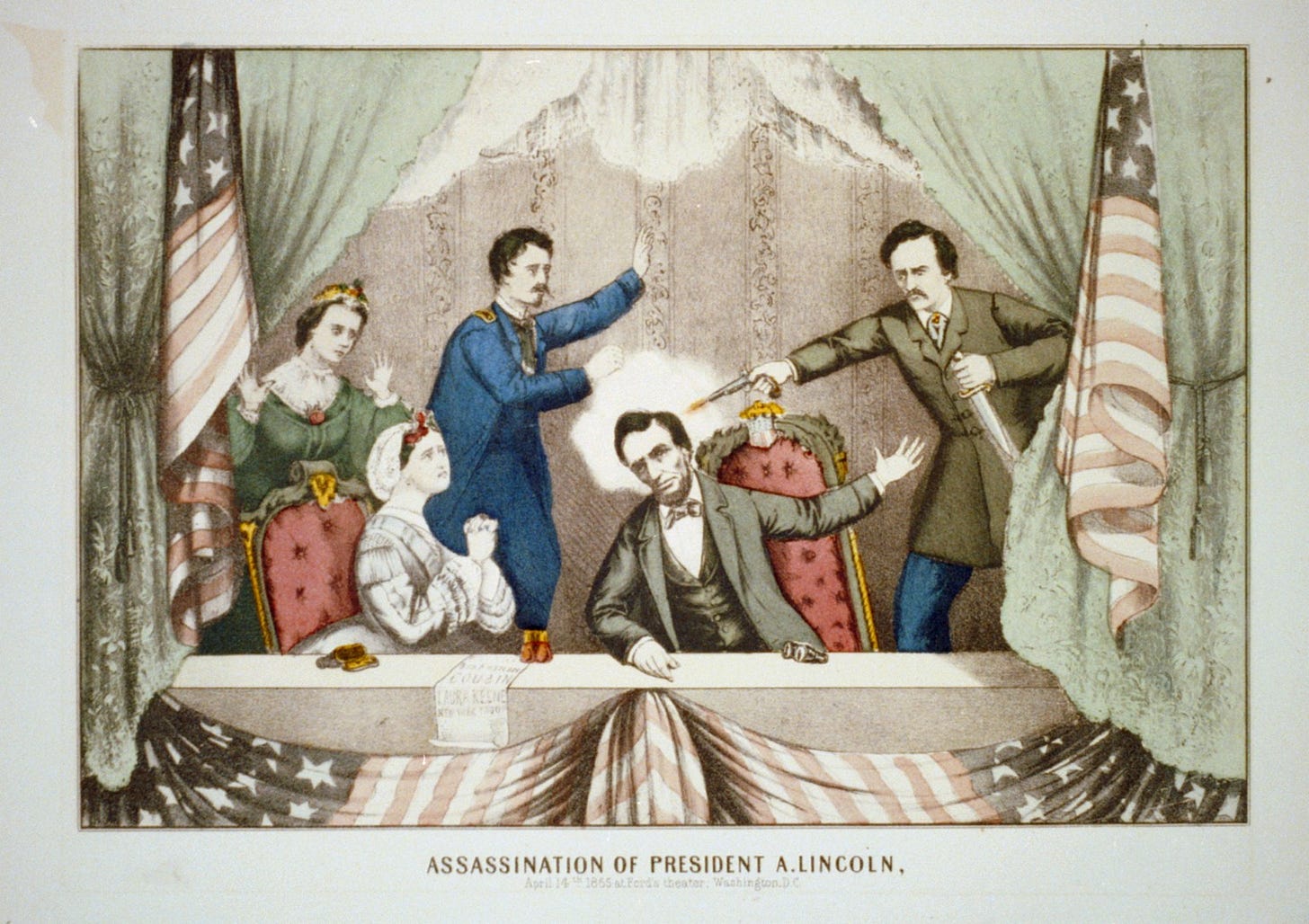Shattered Assumptions
What if the story you tell yourself is not only not your own, but also a lie?
Tuesday, May 6th, 2025
Writing to you from Denver, Colorado
The story each of us build about the world in our minds is created through a compilation of the events, conflicts, and the “feeling” of the time during our formative years.
The world continues to change, but…
We use the story we’ve formed of the world during the early years of our life as a reference of what is “normal”. During the upbringing of each new generation there are always critical events which mold the generation’s thinking.
Ask any Baby Boomer and they can tell you about what they were doing on the day of JFK’s assassination, MLK’s assassination, the moon landing…
It was shocking.
Those events were life-altering. Not so much in the way that it changed the country, but because it shifted everyone’s psychology - that generation’s view of the world was shaken up, broken, and put back together piece by piece with a story (or explanation) of the event that fit into a larger narrative.
After a major event the way you look at everything in the world changes…
In the blink of an eye a single event on a sunny day in Dallas, Texas would lead to fears of a government coup, fear of nuclear war, fears of more assassinations, fear of civil unrest, and fear of racial violence.
The frame through which people viewed the world shifted…
Some of Gen X may remember Ruby Ridge, Waco, and the Oklahoma City Bombing…but everyone remembers exactly where they were and what they were doing on 9/11…
The “feeling” people have of that time in cemented in their minds forever.
The “Shattered Assumptions” Theory (Janoff-Bulman, 1992)
The core idea of this theory is that people live their lives with a “the world is benevolent” view until traumatic events shatter the core beliefs. This leads to a permanent shift in how people view safety, fairness, or trust in the world.
One time my father and I were talking to Doug Casey.
He was telling us about about what flying used to be like in the 70s…fun, relaxed, and interesting. Believe it or not, Doug told us that he was able to walk onto a plane with a handgun, pull it out, and store it in the overhead compartment.
No one cared. No one was freaked out about a hijacking. It was normal.
Generational shifts in perspective through media, major events, music, literature, and education causes individual (and mass) psychology to be broken and molded over and over again.
A relaxed, open, but serious “feeling” or attitude of a time can do a complete 180 towards “safety”, security, and fear.
The “Shattered Assumptions” theory ties in perfectly with the Narrative Identity Research (Mcadams, 2001)…
We measure our lives in a series of major events or “turning points” that change our perspective of the world and ourselves.
There are characters, themes, settings, plots, episodes…
What’s key about this?
The story we tell ourselves about the past (who we are and what the world is like) almost never changes without the conscious desire to see it change. Meaning that the critical events of the world and the “sense” of the time remains constant in our mind.
How the world actually is in the present or how it will be in the future is clouded over by our own story…
Or someone else’s.
Ronnie Janoff-Bulman’s thoughts within the “Shattered Assumptions” Theory is that a traumatic event causes a total collapse in a person’s framework of the world. The recovery process requires one to create new beliefs that still feel true, but allow for “a sense of safety, meaning, and self-worth.”
But, what if the story we tell ourselves about our life, about traumatic events, and about the world itself is fed to us - a story that makes us feel safe - is fed to us?
Hijacked
We are always crafting a story about the world and ourselves. The story is continuous, but stems from our own experience or our knowledge of the past - at least what we’ve been told about it.
Can I ask you a question? Yes, good.
Okay, if you were seeking to control and manipulate people’s thoughts about the world (and ultimately themselves as well) how would you do it?
Well, you’d gain enough power to blatantly lie about the major events of history to alter how people see the world…then you’d go further.
Top down control.
Take “Honest” Abe for example…
The great American patriot who brought the Confederate’s land to waste for the mortal sin of slavery. The man who fought valiantly for civil rights and crafted the 13th Amendment to free the slaves before his evil executioner assassinated him…making him a martyr for the cause.
That’s what we are taught about him.
How about the fact that he suspended Habeas Corpus in 1861 to allow for the arrest of civilians - including journalists. During his reign he has upwards of 2,000 political prisoners (many were journalists and some reports say he had up to 14,000 prisoners).
Hundreds of newspapers including The Chicago Times was shut down in 1863 for criticizing the Union army.
The South was decimated - the people raped, pillaged, murdered, and stolen from.
Frame shift.
Or how about the Ally’s blockade of Germany during WW1?
Those pesky Germans…WW1 was the precursor for WW2 and they were clearly pre-Nazis aiming to make their first huge strike on Europe to conquer and “purify” the population.
That’s the image that was crafted for me in school and everyone else I know.
I think there’s a reason why we “learn” about WW2 and the Nazis before we are taught about WW1…
The Allies, primarily Britain, began implementing a naval blockade against Germany almost immediately after the outbreak of World War I, in August 1914. However, the blockade became increasingly strict and effective over time, especially by 1915.
The goal was to restrict imports of fuel, food, and raw materials to starve the army…and the civilian population.
The British declared large swaths of the North Sea to be a war zone, intercepted neutral ships, and diverted or confiscated cargo bound for Germany.
This lead to the “Turnip Winter” of 1916-1917 when the population was forced to subsist on turnips after the potato crops failed.
Estimates are that 400,000 to 750,000 German civilians died from disease and starvation from the blockade, which continued even after armistice in November of 1918 and all the way until the Treaty of Versailles was signed in June of 1919.
Germany was forced to give in - signing a treaty which would cripple the country further, bringing them to a state of anorexic, defenseless submission.
And we wonder why a beaten-down population would come back for revenge…
Frame shift.
Your Own Frame
“Every person is a creature of the age in which he lives and few are able to raise themselves above the ideas of the time.”
-Voltaire
The man who rises above his time has 3 elements to his character:
Curiosity (to understand the world and how things work)
An intimate and personal understanding of right and wrong
The desire to craft his own story (to do things on his own terms and see the world in the truest light possible)
Media, stories of major events, music, education - they control (whether it’s intentional or not) the story. A major event comes along and shatters our assumptions again and again while the elements which shape the narrative come back to offer “recovery” through the new narrative.
It’s a doom loop.
The way out is lonely, but true.
It’s about living life on your own terms. Not choosing to follow a prescribed path set for you by the people who are under the trance of the story of the time.
Worldly and well-educated is the goal - like Louis L’Amour.
A man who left home as a teenager with the primary goal of making money for his family (especially during the Great Depression). Along the way he was lead down a path in which he met interesting characters, worked as a lumberjack, caretaker of a mine, sailor, cattle skinner, elephant handler, journeyed across the world (mainly by ship). He read constantly - whatever book he could get his hands on, he read it.
His vast experience gave him a unique perspective on the world. The practical skills he learned combined with his academic learning let him see the world in detail from multiple different points of view.
You can’t trick a man like that or tell him a false story.
He knows who he is, what he’s done, a fair bit about the world, it’s history, and how it works.
Rise above the times.
-Maxim Benjamin Smith







Good job.
"Rise above the times".
That's the quote of the week. Keep it up, you are doing well young man.